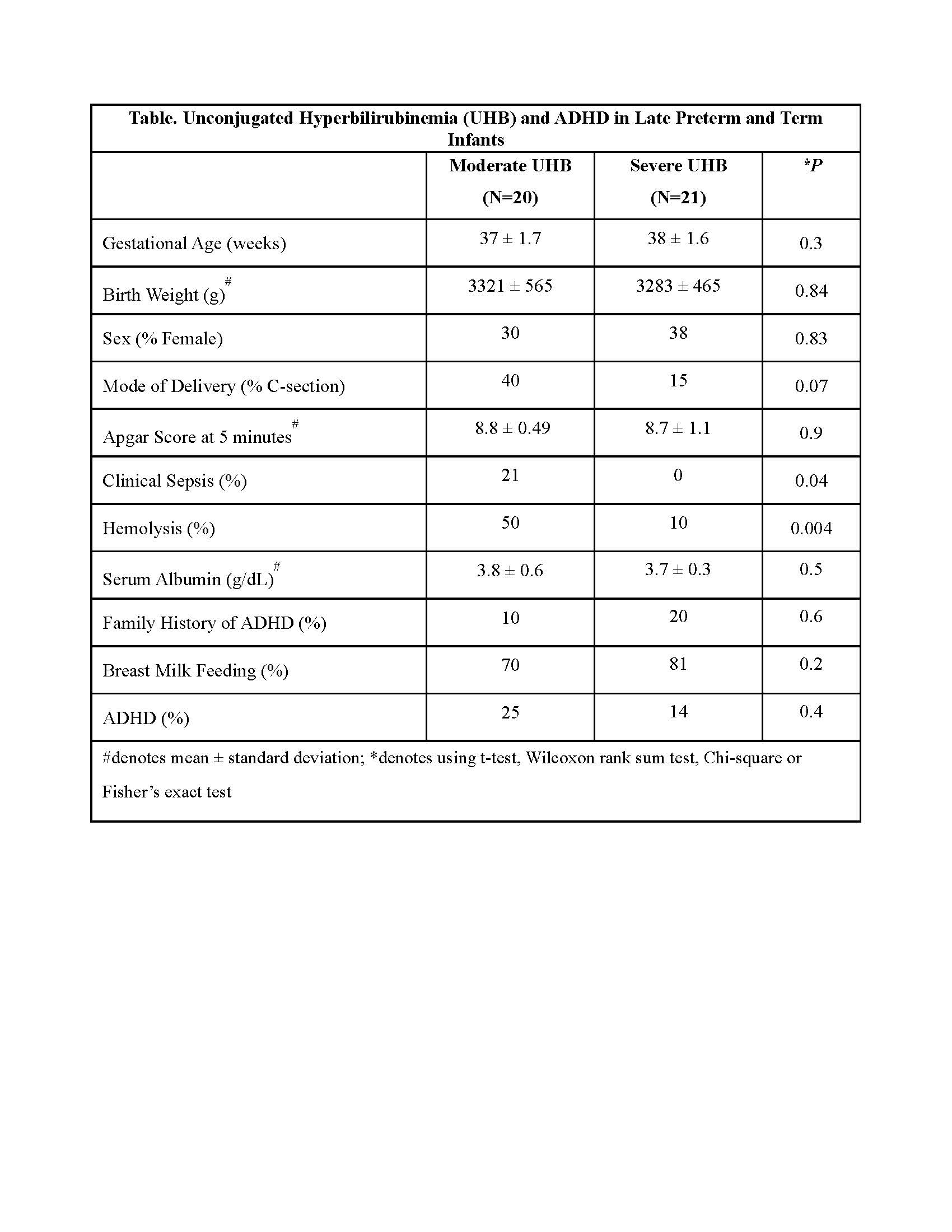Neonatal Hematology & Bilirubin Metabolism
Category: Abstract Submission
Neonatal Hematology & Bilirubin Metabolism II
355 - Unconjugated Hyperbilirubinemia and Attention Deficit Hyperactivity Disorder in Late Preterm and Term Infants
Friday, April 22, 2022
6:15 PM - 8:45 PM US MT
Poster Number: 355
Sanjiv Amin, Children's Hospital of Michigan, Detroit, MI, United States; Satish Saluja, Sir Ganga Ram Hospital, NEW DELHI, Delhi, India
- SA
Sanjiv Amin, MD, MS
Professor of Pediatrics
Children's Hospital of Michigan
Detroit, Michigan, United States
Presenting Author(s)
Background: Severe unconjugated hyperbilirubinemia may be associated with attention deficit hyperactivity disorder (ADHD) during childhood; however, previous retrospective studies have provided conflicting results.
Objective: To evaluate the association of neonatal unconjugated hyperbilirubinemia with ADHD at ≥ 4 years of age in late preterm and term infants with moderate to severe unconjugated hyperbilirubinemia.
Design/Methods: We performed a prospective longitudinal study involving ≥ 34 weeks gestational age (GA) infants with moderate to severe unconjugated hyperbilirubinemia during the first two weeks after birth. Infants with chromosomal disorders, craniofacial abnormalities, TORCH infections, maternal illicit drug use, major surgery, head injury requiring hospitalization, and malignancy were excluded. Infants were evaluated at ≥ 4 years of age for ADHD using Vanderbilt, a validated standardized questionnaire, which was filled out by parents.
Results: A total of 51 infants with moderate to severe unconjugated hyperbilirubinemia and who were ≥ 4 years of age were followed for ADHD. Of these 51 infants, one infant with history of head injury was excluded. A total of 41 infants completed evaluation for ADHD. Eight infants were deemed to have ADHD. For analyses, subjects were divided into two groups using the median peak total serum bilirubin (PTSB) of 21 mg/dL: 1) Moderate hyperbilirubinemia (PTSB < 21 mg/dL, mean PTSB 17 mg/dL) and 2) Severe hyperbilirubinemia (PTSB ≥ 21 mg/dL, mean PTSB 25 mg/dL). There was no significant difference in pregnancy induced hypertension, maternal diabetes during pregnancy, mode of delivery, and Apgar score at 5 minutes between the two groups. There was no significant difference in neonatal clinical characteristics except for the incidence of sepsis and hemolysis between the 2 groups (Table 1). There was no significant difference in family history of ADHD, history of fever > 104°F, history of iron deficiency, maternal age, maternal education, maternal employment status, and marital status at the time of ADHD evaluation between the 2 groups. On regression analysis controlling for confounders, severe unconjugated hyperbilirubinemia was not associated with an increased risk of ADHD compared to moderate unconjugated hyperbilirubinemia (Odds ratio 2.08; 95% CI:0.12-34.8).
Conclusion(s): Unconjugated hyperbilirubinemia, as indexed by PTSB, may not be associated with ADHD in late preterm and term infants with moderate to severe hyperbilirubinemia.
Unconjugated Hyperbilirubinemia and ADHD in Late Preterm and Term Infants
Objective: To evaluate the association of neonatal unconjugated hyperbilirubinemia with ADHD at ≥ 4 years of age in late preterm and term infants with moderate to severe unconjugated hyperbilirubinemia.
Design/Methods: We performed a prospective longitudinal study involving ≥ 34 weeks gestational age (GA) infants with moderate to severe unconjugated hyperbilirubinemia during the first two weeks after birth. Infants with chromosomal disorders, craniofacial abnormalities, TORCH infections, maternal illicit drug use, major surgery, head injury requiring hospitalization, and malignancy were excluded. Infants were evaluated at ≥ 4 years of age for ADHD using Vanderbilt, a validated standardized questionnaire, which was filled out by parents.
Results: A total of 51 infants with moderate to severe unconjugated hyperbilirubinemia and who were ≥ 4 years of age were followed for ADHD. Of these 51 infants, one infant with history of head injury was excluded. A total of 41 infants completed evaluation for ADHD. Eight infants were deemed to have ADHD. For analyses, subjects were divided into two groups using the median peak total serum bilirubin (PTSB) of 21 mg/dL: 1) Moderate hyperbilirubinemia (PTSB < 21 mg/dL, mean PTSB 17 mg/dL) and 2) Severe hyperbilirubinemia (PTSB ≥ 21 mg/dL, mean PTSB 25 mg/dL). There was no significant difference in pregnancy induced hypertension, maternal diabetes during pregnancy, mode of delivery, and Apgar score at 5 minutes between the two groups. There was no significant difference in neonatal clinical characteristics except for the incidence of sepsis and hemolysis between the 2 groups (Table 1). There was no significant difference in family history of ADHD, history of fever > 104°F, history of iron deficiency, maternal age, maternal education, maternal employment status, and marital status at the time of ADHD evaluation between the 2 groups. On regression analysis controlling for confounders, severe unconjugated hyperbilirubinemia was not associated with an increased risk of ADHD compared to moderate unconjugated hyperbilirubinemia (Odds ratio 2.08; 95% CI:0.12-34.8).
Conclusion(s): Unconjugated hyperbilirubinemia, as indexed by PTSB, may not be associated with ADHD in late preterm and term infants with moderate to severe hyperbilirubinemia.
Unconjugated Hyperbilirubinemia and ADHD in Late Preterm and Term Infants

